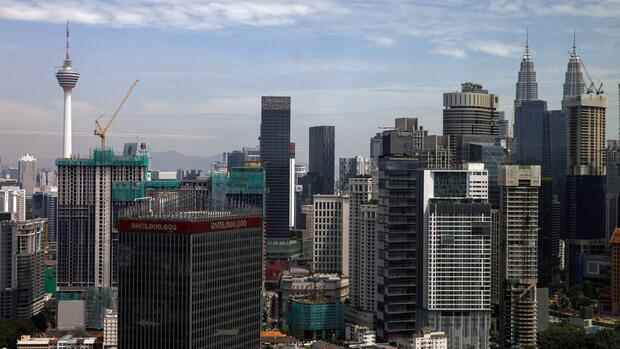Malaysia is one of the booming Asian countries.
(Photo: Bloomberg)
Bangkok So far, the suppression of the democracy protests in Hong Kong has done just as little to deter German business from doing business with China as the suppression of the Uyghurs. But even if the human rights situation is not a reason on many executive floors to reconsider the commitment in the People’s Republic, China’s economic situation makes the question of a realignment unavoidable.
The time when China was the major growth driver of the global economy is over, at least for the time being. The most dynamic economic regions in the world can still be found in Asia – but far away from the rule of China’s Communist Party. Getting involved in these new future markets is not only worthwhile because of China’s weakness, but above all because of the strength of the alternatives.
And it is the democracies that are booming: India, Indonesia, Bangladesh, Malaysia and the Philippines – the five countries are currently achieving growth rates of five to seven percent. China, on the other hand, will struggle with the three percent mark in 2022.
Europe needs to open up much more to trade with southern Asia
German companies must also adapt to this new reality. So far, their Asia strategy has been “China plus one”: The People’s Republic was set as the investment location, but for the sake of diversification, another country was looked at.
Top jobs of the day
Find the best jobs now and
be notified by email.
But with the approach of viewing the huge growth region between the Hindu Kush and the South China Sea merely as an appendage of its commitment to China, the German economy has only had limited success so far: in the sales markets of South and Southeast Asia, there is competition from Japan, South Korea – and yes, also from China – often far ahead.
In order to reduce dependence on a weakening China, serious investments are now needed – not only on the part of companies, but also on the part of politicians. Federal Economics Minister Robert Habeck’s considerations of shifting the focus of government foreign trade promotion more from China to other Asian countries are a step in the right direction. However, Europe still needs to open up much more to trade with southern Asia.
EU free trade negotiations with countries like India and Indonesia are proving to be incredibly tough – and not just because of the Asian negotiating partners. Europe’s concerns about the sustainability of Indonesian palm oil, for example, have so far stood in the way of an agreement. But it should also be clear in Brussels: If you are too picky when looking for a partner, you will end up on your own.
More: Concerns about the economy are growing – China is bringing up the rear in Asia
